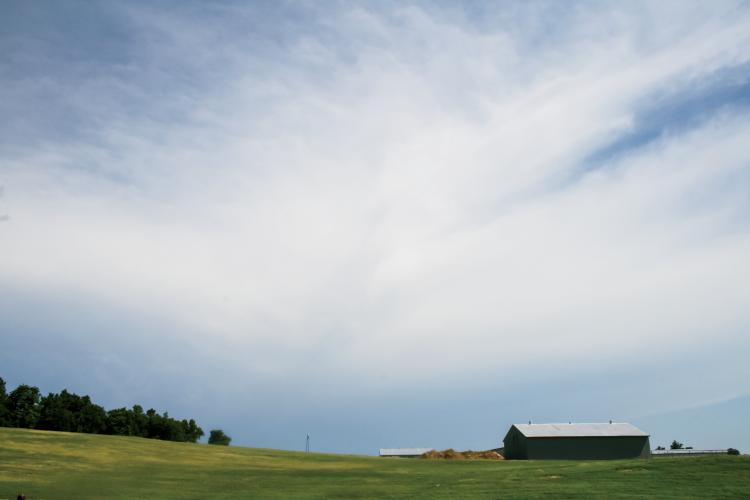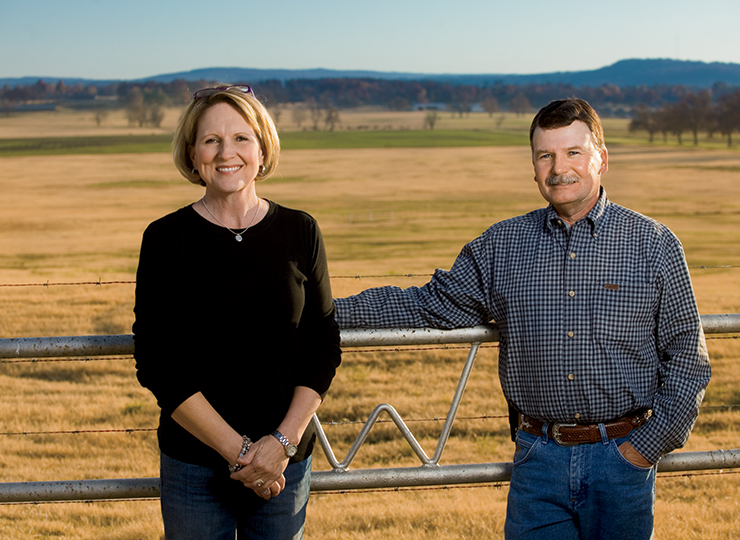Home > Arkansas > Arkansas Farm to Table > Arkansas Century Farms Preserve the Past
Arkansas Century Farms Preserve the Past

If the barn walls of the West Farm in Prairie Grove could speak, they would surely hold your attention, telling a rich story dating back more than 150 years.
In 1862, Union soldiers used the home as a makeshift hospital following the Battle of Prairie Grove. During the first half of the 20th century, the farm witnessed the construction, and abandonment, of a rural railroad. Today, it views a trend toward urban sprawl and agritourism.
Generation after generation, this 455-acre farm has experienced various types of weather, evolving forms of policy and procedure, and advancements in technology. The one consistency, though, is family. The West family has passed down the farm through four generations of agriculture and history lovers. Cheryl West and her husband, Randy, hope to continue this tradition.
“Our twin girls, Natalie and Lindsay, were the fifth generation to grow up on the farm,” West says. “They both have agricultural-based college degrees, and their careers have been heavily focused on agriculture. They have grown up with a love for land just as we have. Now we have a grandson that is the sixth generation to be involved in the farm. He may only be two years old, but he loves everything about the farm. We would love to think that he, or any other grandchildren we may have, would have an interest in running the farm in the future.”
If her hopes come true, future generations will have plenty to work with. The farm is still very much a productive operation, producing between 50,000 and 70,000 square bales of Bermuda grass hay annually. The family also raises broilers for Tyson Foods.

Steeped in History
For Stanley Hill of Witherspoon, upholding the legacy of his historic family farm is key to preserving the land. The small farm, just under 200 acres, was purchased in 1890 by his great-grandfather, Watson Hill, who was sold into slavery at the age of four. “After he was a free man, he ended up in Arkansas and pursued his desire to be a landowner,” Hill says.
Despite his past as a slave, Watson’s records indicated that his father was white and his mother was black.
“We think this fact could be why he was more accepted and was able to purchase the land easily,” Hill says.
Surviving everything from the Depression to recent recessions, the farm made its way through four generations and is currently owned by Hill’s mother (his father passed in 2002). Hill works as the farm manager.
“My father had three brothers and three sisters, and as a kid, I always struggled with why he chose to take over the farm because it meant I had to do chores while my cousins got to play basketball,” Hill says. “But as an adult, I realized that it was a good thing. The farm was my father’s passion.”
In his father’s lifetime, the land was used early on as pasture for cattle grazing, and later for row crops like cotton, soybeans and winter wheat. In fact, Hill’s father won the wheat challenge for the most productive harvest in the county one year. Currently, the Hill family leases the land, which is being mainly used for row crops.
The farm is a certified Arkansas Century Farm, a designation of the Arkansas Agriculture Department honoring families who have owned and farmed the same land for at least 100 years.
As for the future of the farm, Hill can’t say for sure whether any of his children, nieces or nephews will actively be involved with the farm, but they know it’s important to the family.
“We intend to continue ownership in the family in the future,” he says.

Farming for the Future
Back in Prairie Grove, Cheryl Wests says her children have pursued career paths that will better prepare them to take over the family farm one day.
“We know that [our daughters’] generation will have different challenges in maintaining the farm,” West says. “Land prices continue to soar, and more and more people in this area sell their farmland for real estate development. We believe their background and education in agriculture will help the girls and their families to make the best decisions they can regarding the farm in the future.”
While many producers today know the importance of looking ahead in order to have a productive operation, the Wests encourage others to discover the history of the farm.
“Rand spent a lot of time about 20 years ago researching his family tree,” West says. “He looked at microfilm in libraries, and collected and preserved as many family documents as he could find that told the story of the farm.”
The West family was able to get the walls of the family farm to talk. And the story it tells is of a history of progress and the promise of a dynamic future.
“We are grateful to have the West Farm recognized as an Arkansas Century Farm,” West says. “We are proud of our family’s farming heritage in this great state.”



